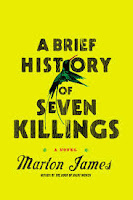"A Brief History of Seven Killings" by Marlon James
On December 3, 1976, gunmen stormed the house of Bob Marley in Jamaica, two days before he was scheduled to play at a peace concert. Marley, his wife, and his manager were nearly killed and several others were injured. But he would go on to perform at the concert two day laters, then leave Jamaica the very next day and not return for two years.
At the time of the concert, Jamaica was gearing up for a general election. The country was divided between the governing People’s National Party (PNP) and the opposition Jamaica Labour Party (JLP), not just at the ballot box but in everyday life. The parties gave power and wealth to local gangs in exchange for the allegiance of their territories, which led to decades characterized by gang warfare. The Smile Jamaica concert was meant to bring both sides together, to work toward peace. But because it was organized by the government, many felt that it was a political event and that by participating in it, Marley was endorsing the PNP.
Add to this the presence of the CIA (there to fight communism), the distribution of cocaine throughout the island and beyond, and a level of poverty no tourist ever sees, and you have a beautiful island shaped by a very volatile situation.
A Brief History of Seven Killings by Marlon James tells the story of Jamaica in the 1970’s and 1980’s, of an island characterized by poverty and political violence but sustained by a determined people and musical culture.
I’m going to start out this review by declaring this book my best book of 2015. Yes, there are a few months left in the year and yes, there are still quite a few great books to come but I just know that nothing is going to be able to take that distinction from this book. I was, and still am, absolutely blown away by this book. With its rich cast of characters and sweeping plot, this is an ambitious book that hits every spot.
While the book is written around the assassination attempt on Bob Marley, known in the book only as “The Singer,” it uses that incident as a point to centre the story around. But the shooting is only one piece of a very large puzzle. James intricately weaves the sights, sounds, people, and politics of the island into a masterful story.
This isn’t an easy read, in a few different ways. At 700 pages, it is long. It is a length that feels very daunting at first but the more you read, the more you realize that it is a book that will give and give with each page. This book actually took me about two weeks to read because of the effort you have to put into it. Most of the chapters told by Jamaican characters are written in Patois, just enough that the reader gets the full vibe of the language but not so much that a reader unfamiliar with the language will find difficulty. Keep your computer close so you can look up words you are unfamiliar with, Jamaican Patois is a language where you want to get the true meaning of the word. The book also has a full cast of characters and at times it becomes confusing as to who is in the scene. You’ll find yourself flipping back to the list of characters often just to keep everyone straight.
The book also leaves the island and takes place in New York in the 1980’s, when drug cartels were shipping their products north and gangs were popping up to control the trade. I thought that this might be the part where I found the book not as interesting (that tends to happen to me when books change to another place from where it started), instead there were new characters to keep my attention and new stories to immerse myself in. There were a few characters where you may be wondering just what they contribute to pushing the story along. But this isn’t a book that is just about its characters, it’s about a nation, its people and politics.
A book of this size and scope deserves a review just as big. There is so much that can be said and yet, I want to let readers discover it all for themselves. This was a deeply personal read for me. My husband grew up in Jamaica in this time period. Each day as I read, I set aside the book to have him tell me of his experience. Does this colour my review of the book? Of course it does. Is it acceptable to assume that others may not feel the same way about the book as I do because they don’t have that personal connection? Very possible. But considering the book has been a finalist for the National Book Critics Circle Award, winner of the Anisfield-Wolf Book Award, winner of the 2015 OCM Bocas Prize for Caribbean Literature, and is now a finalist for the Man Booker Prize, it’s obvious the reader doesn’t need that connection to have an incredible and moving reading experience.




I've been so torn about reading this. The story sounds amazing, but so many people have suggested that the patois makes it impenetrable. It is also so long! But if you put it as your best of 2015 it must be pretty good.
ReplyDeleteIt's hard for me to comment on the patois. I understand it because of my husband and yet there were still a few words I had to ask him about while reading. But, I do think for the most part it is toned down for non-speakers However, if it weren't written in the patois, it would have ruined the story. I think it's worth working through it.
Delete